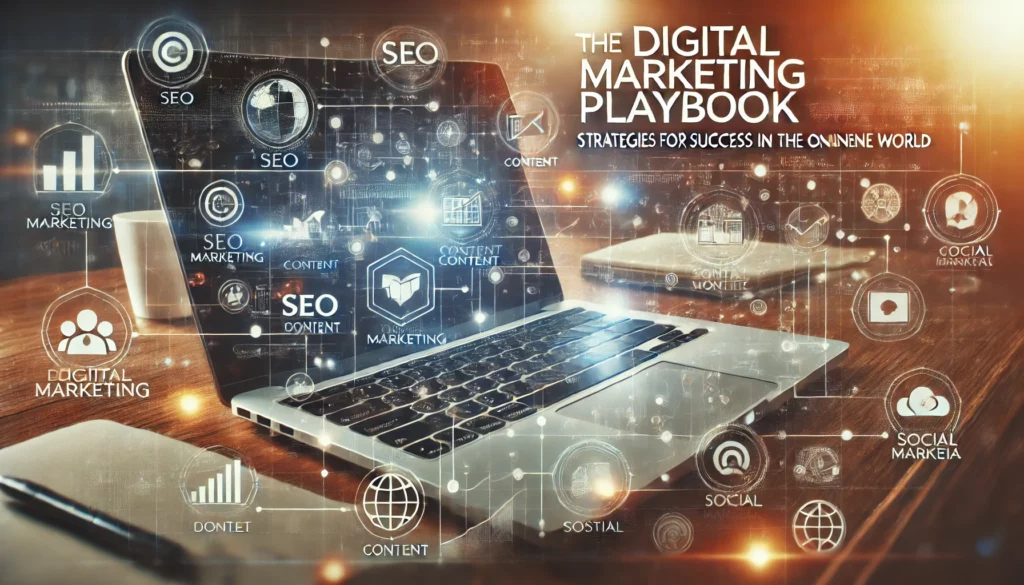
In today’s fast-paced digital age, businesses must adapt to the evolving online world to stay relevant and successful. Digital marketing is a critical part of this transformation, providing companies with the tools and strategies they need to reach and engage their audience effectively. But with so many options and techniques available, how do you choose the right strategies for your brand? In this comprehensive digital marketing playbook, we’ll explore key strategies that can help businesses thrive in the online world.
Understanding Digital Marketing
Before diving into the strategies, let’s first define what digital marketing is. Simply put, digital marketing refers to any marketing effort that uses digital channels such as search engines, websites, social media, email, and mobile apps. The primary goal of digital marketing is to connect businesses with their target audience using online platforms.
What Makes Digital Marketing Different?
Unlike traditional marketing, digital marketing allows for real-time interaction with customers, enabling businesses to quickly respond to market changes. With the ability to track, measure, and adjust campaigns instantaneously, businesses have the advantage of optimizing their efforts for maximum impact.
Key Strategies for Digital Marketing Success
Now, let’s take a closer look at some of the most effective strategies for succeeding in the online world.
1. Search Engine Optimization (SEO)
SEO is the foundation of any digital marketing strategy. It involves optimizing your website to rank higher on search engine results pages (SERPs) for relevant keywords. The goal is to increase organic traffic to your site, making it easier for potential customers to find you.
Best SEO Practices
- Keyword Research: Identify the most relevant keywords for your business.
- On-Page SEO: Optimize meta tags, headings, images, and content for targeted keywords.
- Backlink Building: Gain backlinks from reputable websites to improve your domain authority.
- Technical SEO: Improve site speed, mobile-friendliness, and user experience.
2. Content Marketing
Content is king in the digital world. Creating valuable, informative, and engaging content can help build trust with your audience, increase brand awareness, and drive conversions. Whether through blogs, videos, infographics, or podcasts, content marketing allows businesses to connect with their audience on a deeper level.
Content Types to Focus On
- Blog Posts: Share valuable insights and tips related to your industry.
- Videos: Create tutorials, product demos, or customer testimonials to boost engagement.
- E-books & Guides: Offer in-depth resources to educate your audience.
3. Social Media Marketing
Social media platforms like Facebook, Instagram, Twitter, and LinkedIn have become essential tools for digital marketing. Sociall media marketing allows businesses to reach a wider audience, engage with customers in real-time, and promote their products or services.
Building an Effective Social Media Strategy
- Content Creation: Post engaging and shareable content.
- Audience Engagement: Respond to comments and messages promptly.
- Paid Social Ads: Use targeted ads to reach specific demographics.
4. Pay-Per-Click (PPC) Advertising
PPC is one of the quickest ways to gain visibility in search engines. With PPC, you pay each time someone clicks on your ad. Platforms like Google Ads and Bing Ads allow businesses to bid on specific keywords and target potential customers with highly relevant ads.
Tips for a Successful PPC Campaign
- Keyword Targeting: Choose keywords with high intent and low competition.
- Ad Copy: Write compelling ads that encourage users to click.
- Landing Pages: Create optimized landing pages that drive conversions.
5. Email Marketing
Email marketing remains one of the most powerful tools in digital marketing. By sending personalized and targeted emails, businesses can nurture leads, engage customers, and increase sales.
Best Practices for Email Campaigns
- Segment Your List: Group subscribers based on their interests and behaviors.
- Personalize Emails: Use the recipient’s name and tailor content to their preferences.
- Include a Clear Call-to-Action (CTA): Direct recipients to take the next step.
6. Affiliate Marketing
Affiliate marketing involves partnering with individuals or companies (affiliates) who promote your products or services in exchange for a commission on sales. It’s a great way to extend your reach without directly spending on advertising.
How to Launch an Affiliate Program
- Choose the Right Affiliates: Partner with influencers or content creators who align with your brand.
- Set Clear Terms: Define commission rates and performance expectations.
- Track Results: Monitor affiliate performance to ensure success.
7. Influencer Marketing
Influencer marketing involves working with influencers to promote your brand. With their large and loyal followings, influencers can help increase your brand’s visibility and credibility.
Steps for Effective Influencer Partnerships
- Identify Relevant Influencers: Find influencers whose audience matches your target market.
- Negotiate Terms: Agree on deliverables, compensation, and timeline.
- Measure Performance: Track engagement and conversions from influencer campaigns.
8. Conversion Rate Optimization (CRO)
CRO is about improving the percentage of website visitors who take the desired action, such as filling out a form or making a purchase. By analyzing user behavior, businesses can identify friction points and optimize their website for higher conversion rates.
CRO Strategies
- A/B Testing: Test different versions of web pages to see which performs best.
- Simplify Forms: Reduce the number of fields to increase form submissions.
- Improve Site Speed: A fast website improves user experience and conversion rates.
9. Online Reputation Management (ORM)
Your online reputation can significantly impact your business success. ORM involves monitoring and managing your brand’s online presence, ensuring positive reviews and addressing any negative feedback.
Tips for ORM Success
- Monitor Reviews: Regularly check review sites and social media for feedback.
- Respond to Negative Reviews: Address complaints politely and professionally.
- Encourage Positive Reviews: Ask satisfied customers to leave reviews.
The Importance of Analytics in Digital Marketing
To succeed in digital marketing, it’s crucial to track your performance and make data-driven decisions. Using analytics tools like Google Analytics, you can monitor traffic, conversions, and customer behavior to adjust your strategies.
Key Metrics to Track
- Traffic Sources: Identify where your visitors are coming from.
- Bounce Rate: Understand how many visitors leave your site without engaging.
- Conversion Rate: Measure the effectiveness of your landing pages.
Keeping Up with Digital Marketing Trends
Digital marketing is constantly evolving, so it’s essential to stay updated with the latest trends. Whether it’s voice search, AI-powered marketing, or interactive content, keeping an eye on these trends can help you stay ahead of the competition.
Conclusion: Navigating the Digital Marketing Landscape
Digital marketing offers endless opportunities for businesses to grow, engage with customers, and drive conversions. However, it requires careful planning, execution, and continuous optimization. By implementing the right strategies and staying updated with the latest trends, you can create a robust digital marketing plan that helps your business succeed in the online world.
FAQs
1. What is the best digital marketing strategy for small businesses?
For small businesses, focusing on SEO, content marketing, and social media marketing is a cost-effective way to build a strong online presence.
2. How long does it take to see results from SEO?
SEO is a long-term strategy. Typically, it takes 3-6 months to start seeing significant results, but the benefits last for a long time.
3. What is the role of social media in digital marketing?
Social media is crucial for engaging with your audience, building brand awareness, and driving traffic to your website.
4. How do I improve my website’s conversion rate?
By optimizing your website design, simplifying forms, and using compelling CTAs, you can improve your site’s conversion rate.
5. Is email marketing still effective?
Yes, email marketing is highly effective, especially when personalized and targeted. It remains one of the best tools for nurturing leads and driving sales.
Read More :
